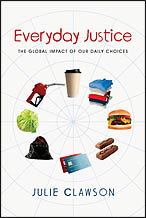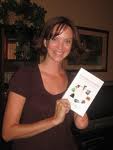| In the last post, I reflected that people of faith ought to be aware of the major issues being discussed at the important G20 Summit in Pittsburgh last week. I tried to suggest that some of what they were doing was good, although I also implied that I believed that the protesters–or at least some of them–had some valid concerns. I obliquely criticized friends who dismissed ’em all, and invited us to be engaged, both supportive of legitimate institutional reforms, and glad for some civil protest in the streets that dramatized the urgent issues. Had I been in the ‘burgh, I’d have been with ’em. I cited one powerful book by a theologian who participated in the famous “battle for Seattle” when the G8 Summit was hosted there many years ago. Her call for social action and resistance to the forces of globalization are well worth reading. If you are a “big picture” kind of reader, an activist or one wanting to be, this will suit you. I also suggested that if you really don’t get what the fuss is about–or why in heaven’s name anybody would want to support civil disobedience around these arcane matters—it is a good introduction to how the resistance movement sees things. It is called Shaking the Gates of Hell and we offered it at 20% off.
 For anyone interested in one of the most foundational matters when For anyone interested in one of the most foundational matters when
talking about the global economy, there is a brand new book that is literally
the best simple introduction to it all I’ve ever read. Is is called Everyday
Justice: The Global Impact of Our Daily Choices by Julie Clawson (IVP; $16.00.)
I will suggest other books about the issues of globalization, development and
such in the September monthly column, but Clawson’s great book deserves to be
mentioned first. It is an engaging and informative read about how the stuff we buy—coffee, clothes, gas, candy, meat—comes from places where the work situations may have been harmful to the growers or producers. Our ordinary shopping choices may effect others in serious ways, and looking at this is a layperson’s entry into the field of global economics. I highly, highly recommend it.
I mention it right off the for three great
reasons, at least.
First, it is upbeat, practical, and interesting. It makes the sometimes abstract theory more human, more concrete. It lets us all get involved. We simply have
to dig deep into some heavy ground if we are going to be responsible stewards of
our gifts as (to use Ron Sider’s phrase from his classic book) “rich Christians
in an age of hunger.” But this helps us see the big picture in practical and
informative ways.
Clawson has chapters on coffee, chocolate, clothes,
fuel, waste, even banking and credit…in
 each section she shows just how our daily choices effect those each section she shows just how our daily choices effect those
in faraway lands. She maps our place in the global big picture in a way that is
easy to follow and, although serious, not terribly harsh. That is, she is not
about creating guilty or knee-jerk over-reaction, and she isn’t simplistic in assigning undeserved blame. Her first sentence, borrowing
from gonzo fantasy novelist Doug Adams, is “Don’t panic.” As Tom & Christian Sine write in the
forward, “Everyday Justice filled us with hope as we read Julie’s insights and
the practical ideas she shares of how we can make decisions that really will
bring everyday justice. These suggestions are possible for all of us to
implement without panicking or feeling overwhelmed.” So it is a great way into the conversation, a primer that is at once helpful without piling on guilt or drama.
Secondly, not only
is this informative and clear as she traces the journey of sweat-shop clothes,
or sugar picked by child labor, or the way gasoline gets from an oil well in
Africa to your gas pump at the convenience store, but she is, as I’ve said,
practical. She understands that we cannot change everything, that social and
political change happens in many ways, and that we each can play a part in
understanding and responding to the ethical dimension of our daily choices.
Consumer demand drives much of the exploitation of God’s groaning creation, and
this affords us a chance to vote with our pocketbooks, making specific informed
decisions about fair trade products, sweat-free producers,
environmentally-conscious corporations. No, we cannot get it right all the time,
but we are linked irrevocably, into a web of interdependence (as King once marvelously put it) and we can do
certain things to love our neighbors better. Everyday Justice offers concrete suggestions, a
few key books and websites in each chapter, and is a fabulous handbook to understanding
particular practices and habits that we can move towards. Almost every chapter has a
case-study store of somebody who has made it a point to make changes in this
aspect of his or her life. Remember that movie What About Bob that had the
therapist teach Bill Murray how to do “baby steps.” Julie Clawson is your
therapist, guiding you baby step by baby step on the journey towards more responsible lifestyle
choices. Everybody quotes Ghandi, these days, about being the change we want to
see in the world. Start here.
Thirdly, Clawson, whose intercultural
studies master’s degree is from the not too shabby Wheaton Graduate School, is a
good writer who is distinctively Christian. That is, she sees that these daily
choices of what food to buy, which coffee shop to support, what kind of
transportation to use, and how to be more committed to ethically traded
products, as a spiritual practice. While this isn’t a Bible study or devotional
guide, it is obviously and intentionally rooted in a high regard for Scriptural
knowledge and faithful obedience. This is not some trendy fad or liberal social
gospel: this is Biblical piety, Christ-like discipleship, firmly orthodox in
intent and tone. It is, as Will Sampson says on the back cover blurb, “a more
complete way of following Jesus.” Or, as Nancy Ortberg writes, “By refusing to
make justice a liberal or conservative cause, she helps us participate in
restoration, ethical consumption and the beautiful pursuit of justice in God’s
world.” I like the way she weaves theological concerns with daily
discipleship; how ordinary choices of where we buy our coffee and chocolate and
jeans and dresses are framed by the call to an abundant life of passion and
purpose. This tour of everyday life includes some sticky
subjects—international tariffs and child labor and sustainable farming–but
it is done corem deo. Thanks be to God for InterVarsity Press for doing such a
fun, thoughtful, practical and righteous resource.
 By the way, Clawson By the way, Clawson
cites some sweet titles that we have long stocked here at the shop. Julia Alverez’s lovely
little coffee plantation tale, A Cafecito Story, the fascinating study of where cotton and our jeans
come from, Fugitive Denim, David Batstone’s must-read, truly excellent Not for
Sale, or the recent Food Inc. book and documentary are all mentioned, showing
that she has waded through the tons of stuff out there on this topic, and has
suggested follow up study using the very best resources. I rather wish (of course I do) that she might have addressed the “buy local” movement, the question about whether cheaper is better and the problems with the faceless corporations, big box stores and monster websites like (ahem) a-zon etc. It would have been useful to give a shout out to indie bookstores, at least, no? It is so frustrating that so many even Christian publishers link to such places, but say nothing in their marketing about local, real stores who deserve support.
By the way, for a wonderfully inspiring call to see shopping as an act of shalom, see Born to Shop? by Hope College professor Dr. Todd Steen, in the latest Comment e-zine. He doesn’t develop his perspective on normative shopping as an appropriate human calling with great detail, but it a quick thesis that would make for fascinating conversation alongside this book. As always, Comment gets this “in but not of” tone of Christian discipleship just right, careful and joyful, on balance, neither liberal nor conservative. Thanks, Todd.
Everyday Justice by Julie Clawson is a book that is not overwhelming, but offers an excellent, readable overview of the complexities of the global economy in a way that is inspiring; it is practical and useful for enhancing our ethical lifestyle habits in different sides of our lives, teaching us what good stewardship entails; it is delightfully rooted in the good news of the Bible. Regardless of what you know about the G20 stuff, or what you feel about the protests and arrests, we all have to understand the ethical dimensions of our daily choices. Authors from Ron Sider to Wendell Berry, from Bill McKibben to Marva Dawn, from Terry Tempest Williams to Gary Haugen and more have said as much. We can add Julie Clawson to this distinguished list, and happily know that she makes it all sound quite plausible, even fun. Order it and another for a friend. We all need support when we make even baby step changes. Join together and pledge to see the covenantal nature of our economic choices come alive with insight and blessing.
G20
20% blog dealEveryday Justiceusually $20 now only $16order here
Hearts & Minds 234 East Main Street Dallastown, PA 17313 717.246.3333
|




I look forward to reading the book. I live among very political people, but there needs to be a personal choice – markets are driven by choices.
Read it. Was definitely challenged. Will be handing out copies to friends & family to help explain why I make some of the choices I do as a consumer – and that I make them BECAUSE I’m a Christian.